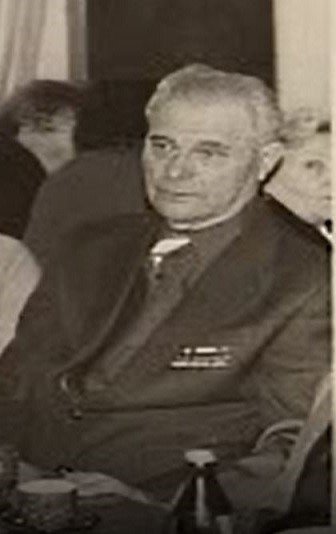Yakov Dainichev was born in Brayiliv, southwestern Ukraine, in 1911. His father Isaak was a shopkeeper before the Russian Revolution of 1917, and later became a barber. His mother was a homemaker. The family was Yiddish-speaking and religiously observant. After finishing high school, Yakov enrolled in a school for railway technicians. In 1933, having finished this technical establishment, he was drafted into the Red Army. He was discharged two years later, in 1935.
On June 22, 1941, the Soviet-German War broke out. On the third day of the war, Yakov Dainichev was drafted into the Red Army for the second time. His unit received no uniforms or weapons, but was sent to the area of Lvov on that same day. Yakov's "military service" began with the eastward retreat from Lvov. He recalls that, prior to the war, he was reluctant to credit the reports of the German mistreatment of the Jews; however, on his way westward in late June 1941, he witnessed masses of desperate Jewish refugees from the Lvov area, trying to flee from the advancing German Army, and this sight made a great impression on him. During Yakov's short stay in Lvov, a local Jew asked him:
'Is it possible that the Germans will come here?' (residents of Lvov had already seen Wehrmacht troops during the September campaign in 1939). "I told him: 'Yes'" – Danichev recalls, – "'If so,' he said, 'we all have to get together and commit mass suicide.' And thus did I realize what was about to happen".1
After some days of retreat, Dainichev's unit was surrounded by the Germans in central Ukraine, and the men were taken prisoner and incarcerated in a POW camp. The fact that Dainichev had no uniform made it easier for him to escape from the camp. He then began the long trek back to his native Brayiliv.
Nominally, Brayiliv was part of the new Romanian Transnistria Governorate; in reality, it was controlled jointly by the Romanian Army and the German Wehrmacht. Dainichev survived two mass murders of Jews in the town, which were carried out by the Germans in February and April 1942. Afterward, he escaped to the ghetto in nearby Zhmerinka. In March 1944, the area was liberated by the Soviets; several days later, Dainichev volunteered to enlist in the Red Army. He was assigned to the 266th Antitank Artillery Regiment, which was deployed in Zhmerinka at the time, as a communications man, in the rank of private. In the fall of 1944, his regiment was transferred to northern Poland, which was the launching pad of the Soviet offensive on East Prussia. In addition to being responsible for telephone communications, Dainichev also had to personally deliver dispatches from the regimental commander to his subordinates; on some occasions, he took part in combat as a common rifleman. He was awarded the medal "For Battle Merit" (in East Prussia) and the Order of the Red Star (in eastern Germany, the Dresden area).
In 1989, Yakov Dainichev immigrated to the USA; he lived in New York City.
- 1. YVA O.93/38165







